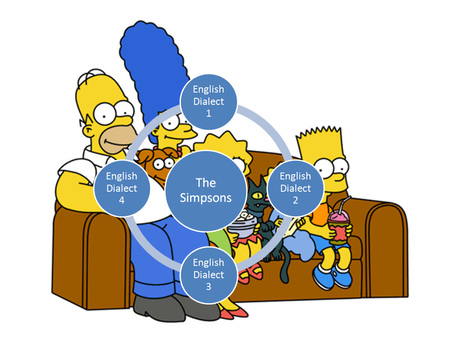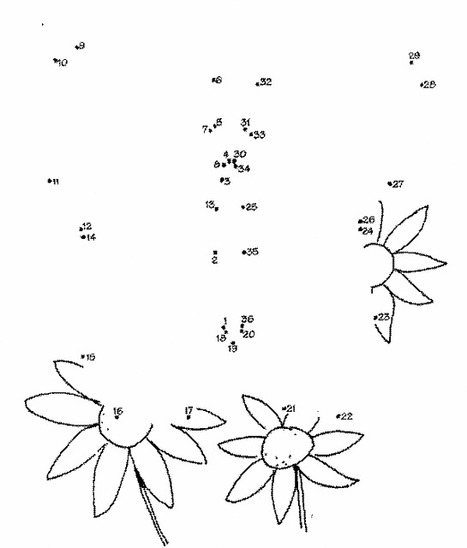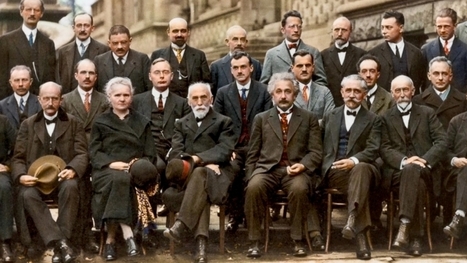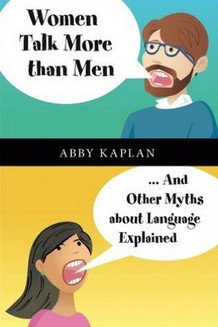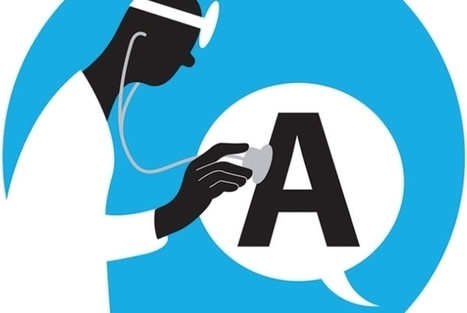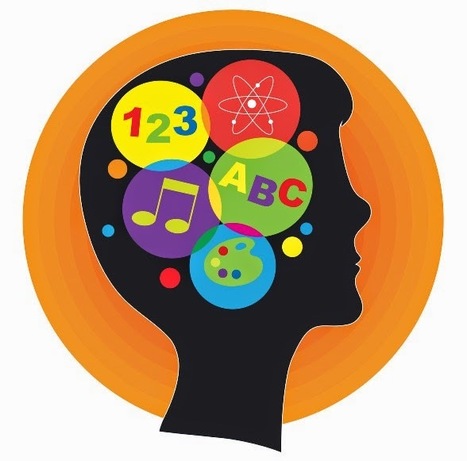 Your new post is loading...

|
Scooped by
STL di Sabrina Tursi
September 15, 2016 6:22 AM
|
Facepalm: avete presente l’emoticon che si mette una mano sulla fronte in segno di sconcerto o disperazione? Ecco! In inglese c’è questo termine che definisce propriamente questo gesto.
Emoticon: abbiamo nominato poco fa questa parola. In realtà in italiano si cerca di tradurla con “faccina”, ma non è la stessa cosa. Infatti non solo semplicemente “faccine”, ma anche espressioni di emozioni.
Serendipity: questo è un concetto molto particolare, è la sensazione che si prova quando trovi qualcosa di imprevisto, mentre stai cercando altro.
Wanderlust: desiderio irrefrenabile e irresistibile di viaggiare. C’è chi dice che sia una vera e propria sindrome!
Googly: è un termine usato nel cricket per definire un movimento anomalo del lanciatore.
Swag: non è solo il modo in cui una persona si veste, è il suo modo di essere, il suo stile.

|
Scooped by
STL di Sabrina Tursi
July 7, 2016 12:25 PM
|
But how can we know if a translation is good? According to the ILR Skill Level Description for Translation Performance, “a successful translation is one that conveys the explicit and implicit meaning of the source language into the target language as fully and accurately as possible.”
What are the main problems we have to deal with? Language is inevitably linked to culture. To help us understand this, the ILR addresses culture as well. “Competence in intercultural communication is the ability to take part effectively in a given social context,” they say, “by understanding what is being communicated and by employing appropriate language and behavior to convey an intended message.”

|
Scooped by
STL di Sabrina Tursi
May 26, 2016 6:09 PM
|
Now we present to you the list of the Top 100 Language Twitter Accounts 2016 (sorted alphabetically) that qualified for the voting phase. Search for your favourite Language Twitter account and click the "Vote" button next to it! Once you voted for a Twitter account, you will see a status message that your vote has been counted. You can vote only once for each category. Enjoy exploring and reading our selection of Twitter accounts! Se il nostro profilo Twitter (https://twitter.com/SabrinaTursi) vi piace prendetevi un minuto e votateci da qui http://bit.ly/1Rbmt3Y Grazie!

|
Scooped by
STL di Sabrina Tursi
April 7, 2016 6:20 AM
|
Scientists may be able to predict who is more likely to recover from language problems following a stroke by examining structures in the right hemisphere of the brain, according to research published in Neurology

|
Scooped by
STL di Sabrina Tursi
February 16, 2016 3:08 AM
|
What’s the difference between a language and a dialect? Is there some kind of technical distinction, the way there is between a quasar and a pulsar, or between a rabbit and a hare? Faced with the question, linguists like to repeat the grand old observation of the linguist and Yiddishist Max Weinreich, that “a language is a dialect with an army and a navy.”
But surely the difference is deeper than a snappy aphorism suggests. The very fact that “language” and “dialect” persist as separate concepts implies that linguists can make tidy distinctions for speech varieties worldwide. But in fact, there is no objective difference between the two: Any attempt you make to impose that kind of order on reality falls apart in the face of real evidence.

|
Scooped by
STL di Sabrina Tursi
February 2, 2016 6:28 AM
|
What’s the difference between a language and a dialect? Is there some kind of technical distinction, the way there is between a quasar and a pulsar, or between a rabbit and a hare? Faced with the question, linguists like to repeat the grand old observation of the linguist and Yiddishist Max Weinreich, that “a language is a dialect with an army and a navy.”
But surely the difference is deeper than a snappy aphorism suggests. The very fact that “language” and “dialect” persist as separate concepts implies that linguists can make tidy distinctions for speech varieties worldwide. But in fact, there is no objective difference between the two: Any attempt you make to impose that kind of order on reality falls apart in the face of real evidence. >LEGGI TUTTO

|
Scooped by
STL di Sabrina Tursi
January 4, 2016 12:31 PM
|
Creativity is intricately woven into translation. Translators need to possess a combination of skills which they masterfully bring together throughout the process of translation. A process which, among other things, entails connecting dots, conveying a culture and picking what works best in a given situation. What are those “dots” translators connect when translating? Language with computer aided software, dictionaries and specialised glossaries, texts and subtexts, one culture and mentality with another. Translators inadvertently combine knowledge and join diverse bits and pieces before achieving the desired outcome. The process of translation is a like a path with scattered paving stones. You pave the way as you go.

|
Scooped by
STL di Sabrina Tursi
November 30, 2015 3:20 AM
|
In today’s world, it’s become a truism: Translation is an essential key for unlocking commerce, communication, mutual understanding, and many other doorways of great and profound importance. I don’t want to belittle this obvious fact. Instead, I’d like to take you on a little journey to a different doorway, one which reveals translation as a master key of even greater complexity and significance than we had thought, one which shows that translation truly defines us. >LEGGI TUTTO

|
Scooped by
STL di Sabrina Tursi
October 26, 2015 4:21 AM
|
Dictionaries incorporate new words every year. Some are pop culture inventions like jeggings, photobomb, and meme. Other words, like emoji and upvote, spring up from technology and social media. Dictionaries respond by creating definitions for anyone who cares to know what a twitterer is. And thank goodness they do; you can learn what an eggcorn is simply by turning a few pages in your trusty updated dictionary.
Interestingly, not all newly added words are recent developments. The Oxford English Dictionary June 2015 new words list included autotune, birdhouse, North Korean, and shizzle! North Korea was founded in 1948. The initial release of the autotuner audio processor was in 1997. >LEGGI TUTTO

|
Scooped by
STL di Sabrina Tursi
September 27, 2015 3:29 AM
|
Un elenco di parole o espressioni che gli anglofoni ci invidiano. Lo ha stilato l'edizione inglese di BuzzFeed, corredando ogni termine di una breve descrizione. Si va da "qualunquismo" a "gattara", da "apericena" a "Basta!". Fino al termine "culaccino", ovvero l'estremità di un insaccato: il sito online lo definisce invece come "la traccia di acqua che lascia un bicchiere umido poggiato sul tavolo".

|
Scooped by
STL di Sabrina Tursi
August 7, 2015 9:37 AM
|
You may think of Latin as the dominant language of science. And for many, many years it was the universal means of communication in Western Europe — from the late medieval period to the mid-17th century, and then it began to fracture. Latin became one of many languages in which science was done.
The first person to publish extensively in his native language, according to Gordin, was Galileo. Galileo wrote in Italian and was then translated to Latin so that more scientists might read his work.
Fast forward back to the 20th century, how did English come to dominate German in the realm of science?

|
Scooped by
STL di Sabrina Tursi
August 1, 2015 12:29 PM
|
Being wrong is painful. Nobody wants to look stupid. And making mistakes feels really stupid.
That’s why learning a new language is so scary. You have to make mistakes. It also explains why so many people give up at the first hurdle – they want to be perfect from day one.
Making mistakes is the only way to become fluent in a language. That’s why I’ve written about it so often.
As much as I emphasise this point, I still hear from language learners who are afraid to say the wrong thing.
What if there was another way to look at mistakes? What if you could embrace mistakes with the same excitement you’d feel about winning the lottery?

|
Scooped by
STL di Sabrina Tursi
July 24, 2015 9:38 AM
|
Music making seems to occur, in some form or another, in all human societies. Although musical behaviour varies in sophistication, music itself seems to be universal across all human cultures and plays a key part in rituals of all varieties, and the origins of these practices seem very ancient.
There’s a theory that music is about more than just entertainment and emotional stimulus. Some evolutionary biologists are rejecting the view that music is just a byproduct of our language evolution. Instead it’s thought to be a critical part of the core functioning of our brains and one that pre-dated our language ability.
|

|
Scooped by
STL di Sabrina Tursi
September 12, 2016 6:30 AM
|
This small region is home to more than 20 languages; some are related to each other (for example, some of the languages are about as similar as Spanish and Italian), but others are from completely different language families. Even though the area is linguistically diverse, the groups that live there share a large number of cultural traditions. One practice shared by most groups is that speakers of the same language are considered close relatives – essentially, brothers and sisters. This means that a man can’t marry a woman with the same native language, because that would be incest. And so, when she marries, a woman moves to her new husband’s community and inevitably brings with her a different language. The couple’s children are socially identified with their ‘father language’, but of course they learn to speak the mother’s language as well, and possibly languages spoken by other in-marrying women in the community (and their children). The result, not surprisingly, is massive multilingualism.

|
Scooped by
STL di Sabrina Tursi
July 4, 2016 6:30 AM
|
Slang, or “short language”, consists of a lexicon of non-standard, informal words and phrases which can refer to a precise social phenomenon, geographical location, and can be used to indicate membership of a particular group. The etymological origins of slang are difficult to trace, largely because it is a spoken discourse which is not registered in corpus linguistics. When Elisha Coles became, with his English Dictionary of 1630, the first lexicographer of Standard English to include slang terminology, he explained that ‘Tis no Disparagement to understand the Canting Terms: It may chance to save your Throat from being cut, or (at least) your Pocket from being pick’d’. The lexicographer, usually male, middle-aged and middle-class, was very much excluded from this contemporary language of criminality known in England as cant. In a society where printing was a relative novelty, books tended to be devoted to the concerns of the educated and powerful, and slang was simply ignored.

|
Scooped by
STL di Sabrina Tursi
May 6, 2016 12:28 PM
|
As stated in CSA’s “Can’t Read, Won’t Buy” study, language is a critical aspect of the buying decision. English reaches only 36 percent of the world’s online and offline buyers.[2] In CSA’s study of 3000 buyers, a full 75% of respondents indicated that when deciding between two similar products, they would buy the product available in their native language.
And more than half of the respondents said they would even prefer lower quality or partially localized content over English or another language they don’t understand. Clearly imperfection in a native language trumps perfection in a foreign language. The world simply does not like to buy something they can’t understand.

|
Scooped by
STL di Sabrina Tursi
March 1, 2016 9:30 AM
|
Novelist and "Life of Pi" author Yann Martel has lived a life of travel and multilingual adventure. Nothing opens the mind like travel, he says, and nothing defines the self, or how we relate to one another, quite like language. Martel adroitly compares the linguistic practices of different nations, noting how the French are often hungry to adopt English words, but French Canadians resist such intrusion. And he dispels linguistic myths, such as the Inuit having more words for "snow" than other languages. Trilingual himself, Martel gives an insider's account of this fascinating topic.

|
Scooped by
STL di Sabrina Tursi
February 2, 2016 9:30 AM
|
As language evolves and new terms enter the mainstream, teenagers are often blamed for debasing linguistic standards. In some cases, their preferred forms of communication—like text messaging—are attacked. But, teens don’t actually influence language as much as is often claimed. That’s one of the key findings in the latest linguistic research by Mary Kohn, an assistant professor of English at Kansas State University. How much a person’s vernacular changes over time may have as much to do with personality and social standing as it has to do with age. The extent to which teenagers are credited with (or blamed for) driving lasting change to language is, she says, “grossly overstated.” The same factors that prompt teens to experiment with new language are applicable to people at many stages of life.

|
Scooped by
STL di Sabrina Tursi
January 25, 2016 9:26 AM
|
Several groups of neuroscientists, psychiatrists and computer scientists are now investigating the extent to which patients' language use can provide diagnostic clues—before a single laboratory test is run. Increased computing power and new methods to measure the relation between behavior and brain activity have advanced such efforts. And although tests based on the spoken word may not be as accurate as gene sequencing or MRI scans, for diseases lacking clear biological indicators, language mining could help fill the gap. >LEGGI TUTTO

|
Scooped by
STL di Sabrina Tursi
December 27, 2015 3:20 AM
|
Some languages, like French, have an official body that decides how words can and cannot be used. English, as a flexible, global language, has no such designated referee. Therefore, there is no definitive answer to whether you're using a word "correctly." It's all a matter of taste and context. But there are opinions. And some count more than others.
Steven Pinker is probably as good an expert to ask as anyone. Helpfully, the renowned Harvard linguist and best-selling author recently wrote a book, titled "The Sense of Style," that aims to help readers improve their use of the English language. If you're in the market for an update to , old Strunk and White, it's probably a good buy. But if you just want to spot-check that you've not been making embarrassing language mistakes for years, a monster list of 58 commonly misused phrases covered in the book that recently appeared in the UK's Independent newspaper is probably a good place to start. >LEGGI TUTTO

|
Scooped by
STL di Sabrina Tursi
October 28, 2015 4:23 AM
|
Photographs often form a large part of communication with clients or friends. Photographs create a certain image in our minds which is connected to feelings evoked by a text. Hence, a lot of documents we receive at Simply Translate from our clients include pictures and photos. The same goes for online documents.
For online documents it is important to pay attention to a number of elements. By translating the image details, you can improve both your SEO position and search results. >LEGGI TUTTO

|
Scooped by
STL di Sabrina Tursi
October 3, 2015 12:30 PM
|
Adam Jacot de Boinod published a book entitled Toujours Tingo, a list of bizarre phrases from all over the globe. The "tingo" from which the book gets its title is a word from Easter Island, meaning to borrow objects from a friend one by one until that friend has nothing left.
In the world of language translation, there are innumerable words and phrases like this one which don't have precise translations back into English or whose idiomatic equivalent is something slightly different. Here is a list of the most bizarre words or phrases from around the world.

|
Scooped by
STL di Sabrina Tursi
August 19, 2015 12:35 PM
|
Los bilingües obtienen todas las ventajas. Mejores perspectivas de empleo, un empujón en su capacidad cognitiva y hasta protección contra la demencia. Un estudio ahora demuestra que pueden ver el mundo de una forma diferente dependiendo de la lengua en que estén operando.
Durante los últimos 15 años se ha producido una cantidad enorme de investigación sobre la mente bilingüe. La mayoría de la evidencia apunta a las ventajas tangibles que trae el uso de más de un idioma. Pasar de un lenguaje a otro, parece ser el tipo de entrenamiento que lleva a tu cerebro a alcanzar altos niveles de flexibilidad.
Del mismo modo en que ejercitarse regularmente te trae algunos beneficios bilógicos, controlar más de un idiomas te trae beneficios cognitivos. Esta flexibilidad mental trae enormes beneficios especialmente en las fases tardías de la vida, los síntomas de envejecimiento cognitivo aparecen más tarde en personas bilingües, trastornos mentales tales como demencia o Alzheimer se retrasan por casi cinco años en personas bilingües.

|
Scooped by
STL di Sabrina Tursi
August 7, 2015 9:34 AM
|
Little kids make such cute mistakes when they talk. We know they're still learning the language, so we tolerate their errors and chuckle at how funny they sound. Behind that chuckle is the assumption that the kids are getting it wrong because they just don't know the rules yet. In fact, kids' mistakes show they know a lot more about the rules than we think. The mistakes are evidence of very smart hypotheses the kids are forming from the limited data they've been given so far. Here are 10 really smart language mistakes that kids make.

|
Scooped by
STL di Sabrina Tursi
July 28, 2015 6:32 AM
|
Have you ever been told by a language teacher that you should avoid translating at all costs and try to understand and think in the native language all the time? I have, but it does not work for me, at least not in the early stages. As a matter of fact, I believe that most teachers who refused translating actually didn't know their mother language enough to trace pertinent, contextual parallels between sentences in the target and the mother language. I'm on the side of those who think that translating coherently is an ultimate skills and proves how high one's level is.
|

 Your new post is loading...
Your new post is loading...








